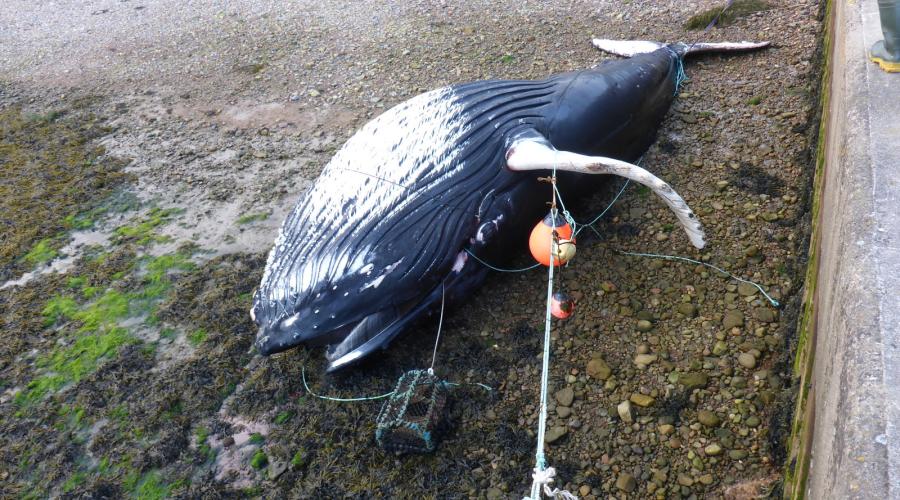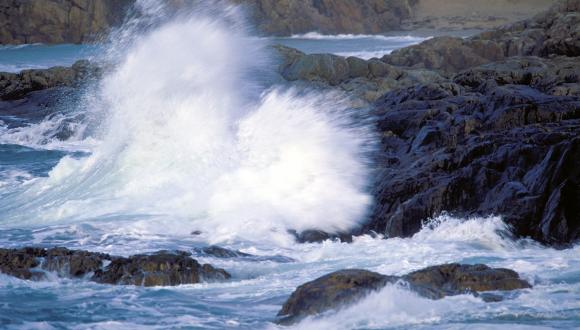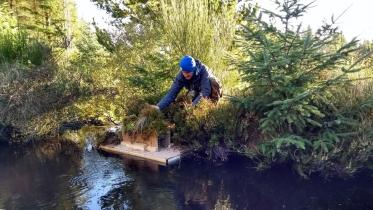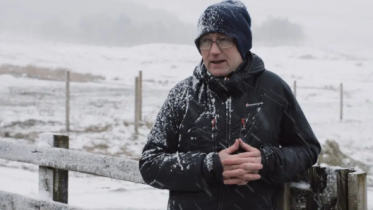
Ground-breaking Scottish project to reduce marine animal entanglement in creel fishing gear
16 December 2021
A ground-breaking project is helping reduce mammal, shark and turtle entanglement in creel fishing gear in Scottish waters.
NatureScot has published a report today on the first phase of the Scottish Entanglement Alliance (SEA) project, the first of its kind in the UK, which brings together commercial creel fishers, NatureScot, research scientists, and marine mammal conservation and rescue charities to better understand the scale and impacts of marine animal entanglement in Scottish waters.
Entanglements in fishing gear and marine debris can have both welfare and conservation impacts on marine animals, causing injury, impairment and death. Entanglement is the largest identified cause of death due to human activity in minke and humpback whales in Scottish waters, and the only known cause of human-driven mortality in basking sharks and marine turtles. During at-sea surveys, over 22% of live minke whales observed on the west coast of Scotland showed evidence of previous entanglements.
The project involved interviewing 159 creel fishers about their fishing practices and their experience of entanglements. A total of 146 entanglements over a 10-year period were reported. Only a small number of these entanglements were previously known, demonstrating that entanglements are hugely under-reported. The interviews also revealed that a wider range of species were involved than previously known.
Fishers also participated in training events and workshops to promote best practise, reduce entanglement risk, and safely disentangle large marine animals from fishing gear. This training gave fishers the ability to call on each other and safely provide a rapid response to any entangled animal.
Dr Kirstie Dearing, NatureScot’s Fisheries Advisor said:
“We all find it upsetting to see our majestic marine species in distress, so we’re really heartened by the strong commitment and willingness of the fishing industry to work towards practical, safe and sustainable solutions on the issue of entanglement. We will only solve this problem by working in collaboration on potential legislative changes. The new reporting obligation will also help us to understand the extent of the issue more clearly.”
Based on feedback from the fishers, the report recommends a number of ways to combat marine entanglement, including trials of weighted ropes (ropes that sink rather than float) and tighter regulation to limit the amount of gear in the water and caps on creel numbers, all of which were supported by fishers involved in the study. Other recommendations include developing seasonal distribution maps of vulnerable species to identify potential high-risk areas, and trials of ‘on-call’ – or ropeless – fishing systems.
Bally Philp from the Scottish Creel Fisherman’s Federation (SCFF) said:
“The SCFF are proud to have taken part in this study which is at the forefront of understanding and finding mitigations for tackling the global problem of marine animal entanglement in fishing gear. The project demonstrates when an alliance of government, industry, academics and conservation groups collaborate, solutions can be progressed to a degree that would otherwise be hard to achieve. We look forward to collaborating with our partners on sourcing funding for the next phase of this project, which will be to research and develop equipment and strategies to reduce entanglement of cetaceans and sharks in our fisheries.”
This research focussed on entanglements in fishing gear associated with the creel sector; however, cases involving monofilament line and trawl netting have also been observed.
The study was led by NatureScot and supported by partners, the Scottish Creel Fishermen’s Federation, the Scottish Marine Animal Stranding Scheme, British Divers Marine Life Rescue, Whale and Dolphin Conservation, and the Hebridean Whale and Dolphin Trust. It was funded by the European Maritime and Fisheries Fund (EU and Scottish Government funding).
We are currently looking at funding opportunities for a proposed phase two of SEA. This would extend the research over a wider geographical area and examine entanglements in other types of fishing gears commonly used in the UK. It would also include further research on how fishing can be modified, as well as looking at the most high-risk areas and times for fishers to avoid.
Photo credit: Scottish Marine Animal Stranding Scheme (SMASS)





